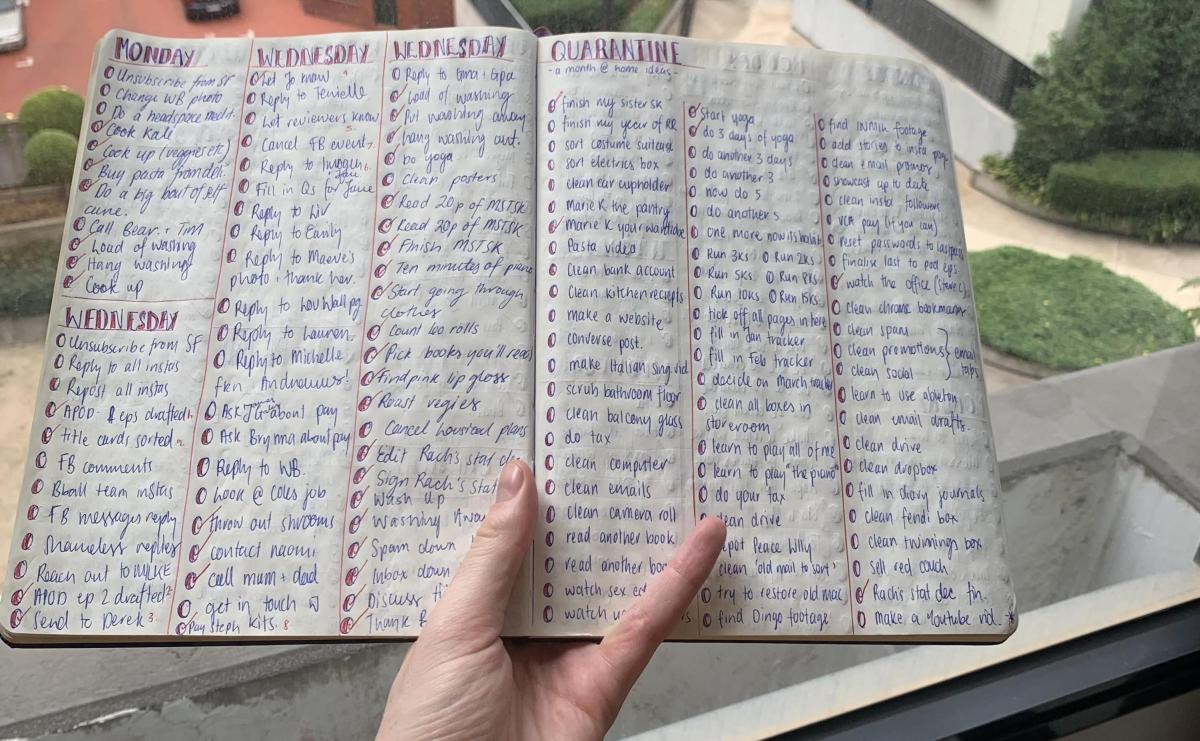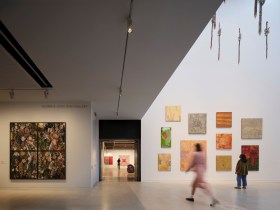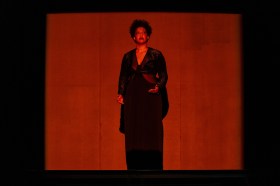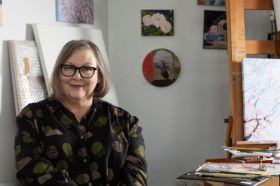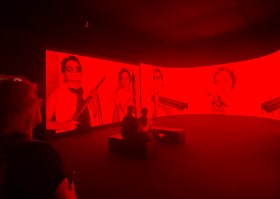Many people in the arts have had to rearrange their lives, their routines, their means of income, and their working lives as we collectively navigate one of the most debilitating times in Australia’s cultural life.
So how do we reshape, relearn, rearrange and find new measures for our work?
On the one hand, there is a proliferation of articles on how to optimise your productivity during the time of the coronavirus crisis, from memes on how Shakespeare wrote King Lear when he was quarantined because of the plague, to advice on creating the perfect working from home routine.
On the other, there are the counter-arguments to ignore all the productivity-pressure, to slow down, rest, reflect.
But just as there is no one way to build a creative career or develop a creative process, there is no one way to navigate a pandemic.
You might need to lean on routines and keep busy during this time – be it out of necessity financially, or for a sense of control when everything feels uncontrollable.
You may need to step away, rest and reset, placing productivity and creativity to the background, either to focus on the people around you, what you need, slowing down, or surviving.
You may need to lean into the rut, to feel the loss, to thrash around, inspect the confusion and grief.
Be it leaning into routine, allowing for the discomfort or finding rest, navigating this profound shift to daily lives looks different for everyone.
So instead of a prescription, here are some approaches that can be mixed and matched, depending on whether you require calm, comfort, productivity or motivation – or need to oscillate between it all – during this unprecedented time.
Create a not-to-do list
Since postponing her new show, Louiscal the Musical, multi-award winning comedian and composer Lou Wall has spent her time oscillating between needing to secure work, finding ways to find a sense of calm and control in her routines, and then resisting the pressure to be ceaselessly productive.
Given the pop-comedy musical is centred around to-do list anxiety – where she set herself the goal of attending to 923 unfinished task from the last 20 years in a 60 minutes live show – it’s perhaps fitting that she first turned to writing a list.
‘As soon as my show was cancelled, I wrote this huge list of maybe 50 or 60 things that I was going to do in isolation… it was so detailed, but so unrealistic,’ said Wall.
While self-soothing, a to-do list can make us incredibly critical of our own self-worth. ‘When I was writing the show, I noticed that a lot of my self-worth is linked to my productivity and how much I can get done in a day, and this became really judgmental and hard on my mental health.’
Wall decided to flip the list into a not-to-do list. ‘Now, each morning I will write out just five things I shouldn’t do that day – for example, not wake up before 9am, not read the news before 12pm, not go for a run. So I still get the satisfaction of a tick and it is still a form of productivity, but the reversal makes it less overwhelming,’ says Wall.
Creating a not-to-do list can flip our approach to our days and often help us celebrate what we have done, rather than view our unfinished to-dos as a failure.
Be a sponge
There is a fine line that many of us teeter during our working lives – with or without a crisis – which is when do we need to resist the busyness or question the productivity trap, and when do we need to shake our complacency and do the work?
If we see our relationship to our work as being sponge-like we can recognise that we often require both – times of doing nothing but taking it all in, learning, absorbing the world like a giant sponge, and the times of output where we require the squeeze.
As writer and community builder Carly Ayes recently described, ‘That’s my comfort zone – sponging. But you can’t sponge too long. Sometimes you need the squeeze – you need the doing, the action, the outpouring of inspiration.’
Finding what mode you need to be in and recognise either are important can help us structure our days accordingly – either with schedules with more space, or filled in order to gain a sense of momentum that intentional work can bring.
Connecting doesn’t mean you have to be constantly connected
Technology has allowed us to be alone and together during this time, but the constant scrolling, news notifcations, virtual meetings and contact can be taxing.
For NASA-trained spacecraft architect turned industrial designer Phnam Bagley co-founder and creative director of Nonfiction, the shift to remote work has been difficult.
‘Not being surrounded by other creatives is hard. We have this amazing collective intuition and productivity going on at the office. We’re trying to keep it alive during video calls, but it’s not the same. We don’t joke as often; we don’t catch each other doing weird things throughout the day. I miss it,’ says Bagley.
If you’re feeling discombobulated from the online communication, you’re not alone. ‘Not being able to catch people’s body language and micro-adjustments in person is hard. The subtleties of language and tone are not there either. The eye contact is artificial and distant. You are inevitably less present during online. The level of attention needs to be much higher, so you don’t misinterpret the dialogue while you still have to drive the vision and opportunities.’
Recognise your own limits and inspect what you can let go off, delete, or decline during this time. ‘Although I appreciate the effort to make things easier, my brain is starting to reach its limits when it comes to app notifications,’ adds Bagley.
Recognise when you need to say no
If any industry has mastered the art of the ‘pivot’ it’s the arts, with artists and arts workers utilising their skills to shift online, band together and use creativity to find new ways of working.
While this very skill is what can buoy us during this time, it’s important to check in with what you may need individually and when to say no.
‘There are so many requests to live stream my work and such a pressure to be creating content right now and creating content that is reactive to the global pandemic,’ explains Wall.
Knowing when to say yes and when to say no is deeply linked to reflection. ‘More than ever, it’s okay to say no and I think of this hustle culture the arts is definitely build around is something we can inspect. You don’t have to come out of this pandemic having learned a new instrument or having upskilled, but with a deeper sense of awareness and turning inwards even using this time just for you.’
Create calming rituals
Depending on each person’s unique circumstances, this may be a time to lean into existing routines in order to create a sense of order and control, however tenuous or create new ones.
For Bagley, sticking to routines helps bring some normalcy to her daily life. ‘Wake up, start working, have lunch/dinner and go to bed at the same time if possible. It keeps your circadian cycle in check, and reduces fatigue and stress related to uncertainty.’
We are also collectively creating new routines, and Bagley has a few suggestions. ‘Check in regularly with your distant friends and family members. Take advantage of technology to rebuild relationships in different time zones. Have breakfast while they’re having dinner. Talk about subjects unrelated to COVID-19 and the dread that surrounds the pandemic. It seems impossible right now, but eventually, people need to think creatively and build new paths to happiness and fulfilment.’
While your days may unfold in various ways, creating routines for your morning or evening can bookend your days ‘One thing that I have followed religiously since the beginning of the lockdown is to treat evenings and weekends as time off. It is very tempting to grab a laptop and catch up on things during off hours when there is nothing to do other than cooking, eating, and reading. I refuse to do that, and taking the time off gives me a sense of a natural rhythm that my circadian cycle appreciate,’ says Bagley.
Routines can also focus on our internal life, not just how we arrange our external environment, adds Bagley. ‘When possible, notice the voice in your head and work to mute it. Anxiety and depression can settle in easily during isolation. When this happens, stare at some art you deeply admire online, watch people talk about their odd passions, type down wild ideas or keep a handwritten journal, listen to something that makes you laugh, make something useful with your hands. Staying creative means staying sane.’
Embrace limitations
We can place a lot of pressure on ourselves and set high expectations when it comes to what we can achieve, create, and do.
But realistically, we won’t get everything we plan to done in our lifetime. As Sylvia Plath wrote in her diaries, ‘I can never read all the books I want; I can never be all the people I want and live all the lives I want. I can never train myself in all the skills I want. And why do I want? I want to live and feel all the shades, tones and variations of mental and physical experience possible in my life. And I am horribly limited.’
Recognising we are horribly imitated can in many ways be motivating, almost empowering, it can help us let go, to stop midway through books we aren’t enjoying and focus on the ones we do, or recognise when we no longer want, or need, to do something we have been holding onto unnecessarily.
When we embrace that we won’t get everything done in our lifetime, or even today, we can focus on the next step in front of us.
It can be helpful to set a timer for just 45-minutes and focus on that one step instead of planning an entire day, week, month, or year that we have witnessed can go in any direction.
It’s okay to be ad-hoc over perfect
When approaching our days and our work, a lot of emphasis can be placed on being consistent as it can help provide a solid base for teams, audiences and our own sense of momentum.
But one common mistake people make when it comes to defining consistency is equating it with intensity. As author of Start with Why Simon Sinek put it, ‘Intensity is like going to the dentist, it is fixed in time, we know exactly which date we are going, we know how long we are going to be there, and we know when we come out our teeth will feel smooth and look pearly. But if that is all we do, all our teeth will fall out. In other words, intensity is not enough.’
But just as how only going to the dentist may cause our teeth to fall out, likewise if we miss a day or two of brushing our teeth, they are unlikely to fall out.
Consistency doesn’t have to be all or nothing – you are not simply consistent or inconsistent, rather it is an accumulation of what we do over time.
If you skip your routine or miss a meeting, it doesn’t render you inconsistent. An ad-hoc rather than perfect approach can be more realistic.
It’s okay to feel joy
We are all having vastly different experiences during this time. Some of us will be entirely focused on survival, and some of us might have more time we know what to do with. In either case, perhaps the only small silver lining is that as people, there is always capacity for small, even faint moments of joy.
As the poet Mary Oliver wrote, ‘If you suddenly and unexpectedly feel joy, don’t hesitate. Give in to it. There are plenty of lives and whole towns destroyed or about to be. We are not wise, and not very often kind. And much can never be redeemed. Still life has some possibility left. Perhaps this is its way of fighting back, that sometimes something happened better than all the riches or power in the world. It could be anything, but very likely you notice it in the instant when love begins. Anyway, that’s often the case. Anyway, whatever it is, don’t be afraid of its plenty. Joy is not made to be a crumb. (Don’t Hesitate).’

